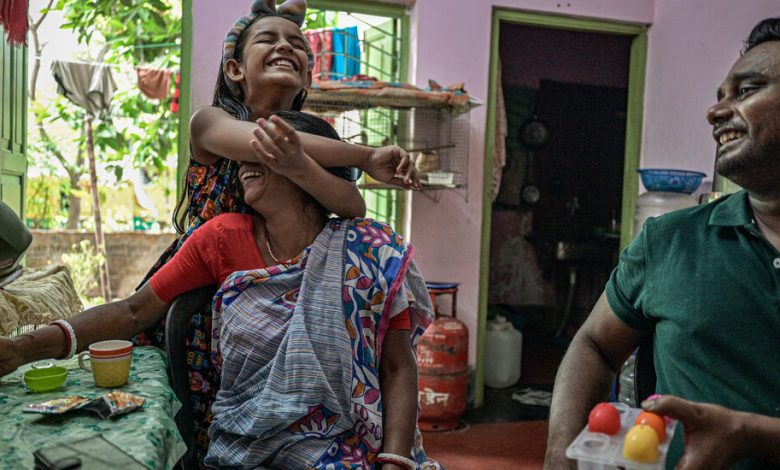Human Trafficking May Be Powerful, but a Mother’s Love Is Even Stronger

KOLKATA, India — This is a story of human trafficking, but mostly it’s a story of a mother’s love, the adoring son she raised and the highest-return investment in the world today.
Nearly two decades ago, I interviewed a woman named Maya Gayen who had been trafficked at the age of 12 to a brothel here. She had not yet reached puberty then, but a man bought her virginity. She wept and pleaded, but the man raped her.
For the next few years, Maya was locked inside the brothel, beaten with sticks, threatened with death if she tried to escape, and raped constantly. She had her first period only after eight months of these rapes.
This went on for years, but one of Maya’s regular customers was a taxi driver who felt badly for her when she wept. One day he helped her escape the brothel. “It may not have been love, but he was sympathetic,” she related.
Or perhaps it was love, for he married her even though his family despised her background and disowned him. The couple rented a one-room hovel in the Kalighat red-light district, and Maya reluctantly sold sex, but as her own boss, while her husband drove for a taxi company.
I will never forget their shack. It was the size of a walk-in closet on the bank of a sewage-laden river that periodically flooded their home. A bed took up most of the room, and Maya had nowhere else to take customers — so her four sons would try to sleep under the bed while she conducted her business.
I was impressed by her oldest son, Avijit, then a scrawny, shy boy of 12 who attended school through an outstanding local nonprofit called New Light. On subsequent trips to Kolkata over the years, I visited Maya and Avijit and witnessed their struggles. Maya always displayed a beatific smile and said she was just happy that she was no longer enslaved in the brothel.
I lost track of Maya and her family, and then on a visit to the Kalighat slum this month I was startled to be greeted by a strapping 29-year-old man who introduced himself in fluent English as Avijit.
With New Light’s help, he had graduated from college, studied French and Italian cooking and moved to Long Beach, Calif., to work as a chef for Carnival Cruise Line. He happens to be back in Kolkata for his annual vacation, to look after Maya.
“She’s the greatest mom ever,” he told me as she stood beaming beside him. “I want to do everything possible to support this lady, because she did a fabulous job raising us.”
Avijit told me that Maya would sometimes starve herself to be able to feed her sons. She would hug her boys tight and tell them to never beg, but reassure them that everything would be all right — and in a violent neighborhood, she was a beacon of love.
“After all her hard work, her sacrifices, we had to give her something,” Avijit told me. So after he got his job with the cruise line in 2017, he sent money so that Maya could retire from the sex trade and rent a nice apartment. He bought a car so his dad could leave the taxi company and become an Uber driver for himself — but on condition that all the income go to Maya to run the household.
My columns from red-light districts over the years have mostly been horror stories about modern slavery, which continues to be an urgent moral issue. “Traffickers exploit millions of people in commercial sex within India,” the State Department wrote last year in its annual report on human trafficking.
But this column is about the flip side — all the talent alive in these rough neighborhoods if we nurture it.
Another New Light alum is Ruma Mondal, 25, whose single mom worked as a prostitute to support her five daughters. A pimp tried to traffic Ruma when she was just 7 years old, but her mom shielded her.
Ruma got an education through New Light and today is working full time on a master’s degree in education — while also holding down a full-time job in data entry to support herself and her siblings. Oh, and on top of all that, she commutes four hours a day.
“I’m fighting for my education,” she told me. And not just for her own: She recently came across a 12-year-old girl who had been trafficked into a nearby brothel, and she contacted the police to arrange a rescue.
It thrills me to see the success of Ruma and Avijit and so many others. This is the human potential that is squandered when we allow children to be locked up in brothels and denied an education. The highest-return investment available today isn’t in private equity or hedge funds; it’s in educating children like Ruma and Avijit.
As for Avijit, his work visa for the cruise ship job unfortunately allows no path to citizenship. So if you’re an American executive who needs a chef, have I got a suggestion for you!
The Times is committed to publishing a diversity of letters to the editor. We’d like to hear what you think about this or any of our articles. Here are some tips. And here’s our email: [email protected].




